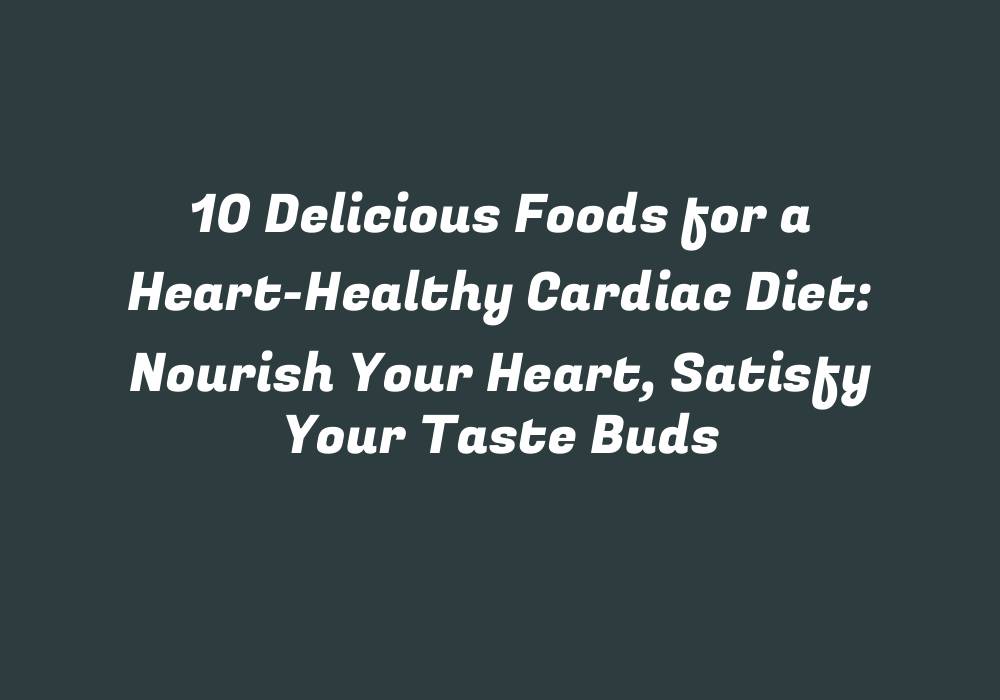Introduction to a Heart-Healthy Cardiac Diet
A balanced and healthy diet plays a crucial role in maintaining good heart health. Your cardiovascular system is the lifeblood of your body, responsible for providing oxygen and essential nutrients to all organs. Therefore, it’s vital to take care of it through proper nutrition. This article presents ten delicious foods that not only nourish your heart but also satisfy your taste buds, making a heart-healthy cardiac diet effortless yet rewarding.
1. Oatmeal: A Hearty and Fiber-Rich Breakfast Choice
Start your day right with oatmeal, which is packed with essential nutrients like soluble fiber, vitamins, minerals, and antioxidants. Oats help lower bad cholesterol (LDL) levels by absorbing bile acids from the body during digestion. In turn, your liver produces more LDL-lowering enzymes to replace these bile acids, reducing LDL concentrations. The combination of complex carbohydrates and high fiber content in oatmeal will keep you fuller for longer periods and maintain stable blood sugar levels, further promoting heart health.
2. Berries: A Colorful and Antioxidant-Rich Treat
Berries are a colorful bunch of small, nutrient-dense fruits that boast potent antioxidants to protect the heart from oxidative stress. Blueberries, raspberries, strawberries, blackberries, and acai berries are some popular options with significant health benefits. They contain flavonoids, a type of antioxidant, which can lower blood pressure and help prevent blood clots by preventing platelet aggregation. Adding berries to your diet will not only benefit your heart but also enhance the taste of salads, smoothies, or even desserts.
3. Avocados: A Creamy Source of Heart-Friendly Monounsaturated Fats
Avocados are a unique fruit known for their high content of monounsaturated fatty acids, which can improve cholesterol levels and reduce the risk of heart disease. They also contain phytosterols, which work similarly to statins in lowering LDL levels without any side effects. Avocados are incredibly versatile ingredients that can be incorporated into various dishes like guacamole, salads, or even as a healthy substitute for less-healthy fats in baked goods and sauces.
4. Fatty Fish: A Source of Omega-3 Fatty Acids
Fatty fish like salmon, tuna, mackerel, and sardines are excellent sources of essential omega-3 fatty acids that promote heart health by reducing inflammation in the arteries. They have been linked to reduced blood pressure, triglyceride levels, and irregular heartbeats. Moreover, these oily fish are rich in protein, low in saturated fats, and contain other vital nutrients like vitamins D and B12. Incorporate fatty fish into your diet by grilling, baking, or even preparing sushi with it for a heart-healthy feast.
5. Nuts and Seeds: A Rich Source of Healthy Fats and Nutrients
Nuts and seeds are nutritional powerhouses packed with unsaturated fats, fiber, and essential vitamins and minerals like potassium, magnesium, and vitamin E. They help lower cholesterol levels and improve blood vessel function, reducing the risk of heart disease. Walnuts, almonds, hazelnuts, and pumpkin seeds are just a few examples of nutritious options to include in your diet. Mix them into salads, yogurt parfaits, or trail mixes for convenient snacking throughout the day.
6. Dark Chocolate: A Heart-Friendly Treat
Dark chocolate contains flavonoids and antioxidants that improve blood flow by relaxing blood vessels and preventing clotting. It also reduces blood pressure, improves cholesterol levels, and lowers the risk of developing heart disease. Be sure to opt for dark chocolate with at least 70% cocoa solids and consume it in moderation as part of a balanced diet for maximum benefits.
7. Whole Grains: A Fiber-Rich Foundation
Whole grains provide essential nutrients, such as B vitamins, iron, magnesium, and fiber, which support heart health by lowering cholesterol and blood pressure levels. Brown rice, quinoa, whole wheat bread, oatmeal, and bulgur are excellent sources of complex carbohydrates, providing slow-release energy to maintain stable blood sugar levels and prevent excessive weight gain – a known risk factor for heart disease.
8. Lean Proteins: A Heart-Healthy Source of Essential Nutrients
Chicken, turkey, lean red meats, fish, eggs, tofu, and beans are all examples of lean protein sources that promote heart health by providing essential amino acids and nutrients. These proteins help maintain muscle mass while assisting in weight management. Limit the consumption of highly-saturated fatty cuts of meat and opt for leaner alternatives to reap their benefits without increasing your risk of heart disease.
9. Fruit Juices: A Sweet and Healthy Alternative to Sugary Drinks
Fresh fruit juices, such as orange or grapefruit juice, are rich in vitamins C and potassium, which help lower blood pressure and protect the heart. These natural fruit juices also contain antioxidants that reduce oxidative stress on cells and tissues throughout the body. However, it’s important to avoid artificially sweetened or high-sugar varieties, as excessive sugar consumption can negatively impact your overall health.
10. Herbs and Spices: Flavorful Additions to Heart-Healthy Cooking
Herbs like garlic, cinnamon, turmeric, and ginger are packed with antioxidants and have been linked to various health benefits. Garlic can lower cholesterol levels and blood pressure, while cinnamon has been associated with better glucose control. Turmeric’s active compound, curcumin, displays anti-inflammatory properties that may reduce the risk of heart disease. Spice up your dishes and reap the added benefits of these flavorful seasonings.
In conclusion, adhering to a heart-healthy cardiac diet can be both nourishing for your heart and enjoyable for your taste buds. By incorporating these ten delicious foods into your meals, you can take control of your health while still indulging in the flavors that bring joy to your dining experience. Remember to consult with your healthcare provider if you have specific concerns regarding a heart-healthy diet or any other dietary needs.
